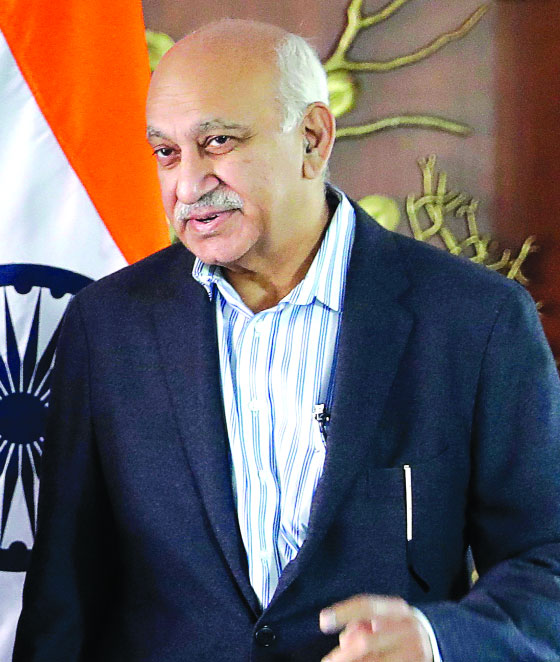The court of Additional Chief Metropolitan Magistrate (ACMM) on Thursday said it will examine the statements by former Union Minister MJ Akbar and other witnesses on October 31, in the defamation case filed by the journalist-turned-politician against journalist Priya Ramani.
The #MeToo controversy had jolted the political quarters and led to the ouster of Akbar, who was Minister of State for External Affairs and had to demit office on Wednesday evening.
Akbar has filed a defamation suit against Ramani, who made allegations of sexual harassment against Akbar.
Ramani has accused Akbar of sexual misconduct around 20 years ago. Ramani’s claims were seconded by several other women, who took to the social media and revealed their harrowing accounts of alleged sexual misconduct by Akbar.
Over the past 10 days, at least 20 women have come forward to narrate their experiences of alleged sexual harassment at the hands of Akbar during his days as editor of several mainstream publications.
Scores of scribes, lawyers and onlookers thronged the small courtroom at courts complex on Thursday around 2 pm to witness the first hearing of the high-profile defamation case. However, the curiosity, subsided drastically the moment they came to know that neither Akbar nor Ramani would visit the court for their first judicial face-off.
During the 20-minute-long hearing in the Patiala house court complex, Additional Chief Metropolitan Magistrate Samar Vishal heard the submissions of senior advocate Geeta Luthra, representing Akbar, who said the “controversial” tweets and similar social media posts of Ramani have cause irreparable loss to Akbar’s reputation built over 40 years.
“Let the matter be fixed for examination of the complainant (Akbar) and his witnesses for October 31,” said the magistrate.
Akbar has listed names of two senior woman journalists -- The Sunday Guardian’s Editor Joyeeta Basu and journalist Veenu Sandal -- and four others as his witnesses to prove his defamation charges against Ramani.
The senior lawyer referred to the sequence of events and said Akbar has resigned from the post of Minister of State for External Affairs due to these allegations and this showed the extent of damage caused to his reputation. She also referred to the reputation of Akbar as a journalist and sought judicial intervention in the matter by taking cognisance of the complaint.
Akbar’s name had cropped up in the social media campaign #MeToo against alleged sexual harassment when he was in Nigeria. Hours after returning home, Akbar had termed the allegations as “false, fabricated and deeply distressing” and said he was taking appropriate legal action against them.
As per the Code of Criminal Procedure (CrPC), the court would now record the pre-summoning evidence and statement of Akbar and other witnesses, referred to in the complaint and would issue notice to Ramani to face trial if it is satisfied that there are prima-facie substance in the complaint.
“Ramani has tweeted defamatory tweets against the complainant. Her 2nd tweet was clearly defamatory and liked by 1,200 people,” Akbar’s lawyer Luthra reportedly told the court.
“Since I have decided to seek justice in a court of law in my personal capacity, I deem it appropriate to step down from office and challenge false accusations levied against me, also in a personal capacity. I have, therefore, tendered my resignation from the office of Minister of State for External Affairs. I am deeply grateful to Prime Minister Narendra Modi and to the External Affairs Minister Sushma Swaraj for the opportunity they gave me to serve my country,” Akbar had said in his plea.
The women who accused Akbar of sexual harassment, included Ghazala Wahab, Shuma Raha, Anju Bharti and Shutapa Paul.


























